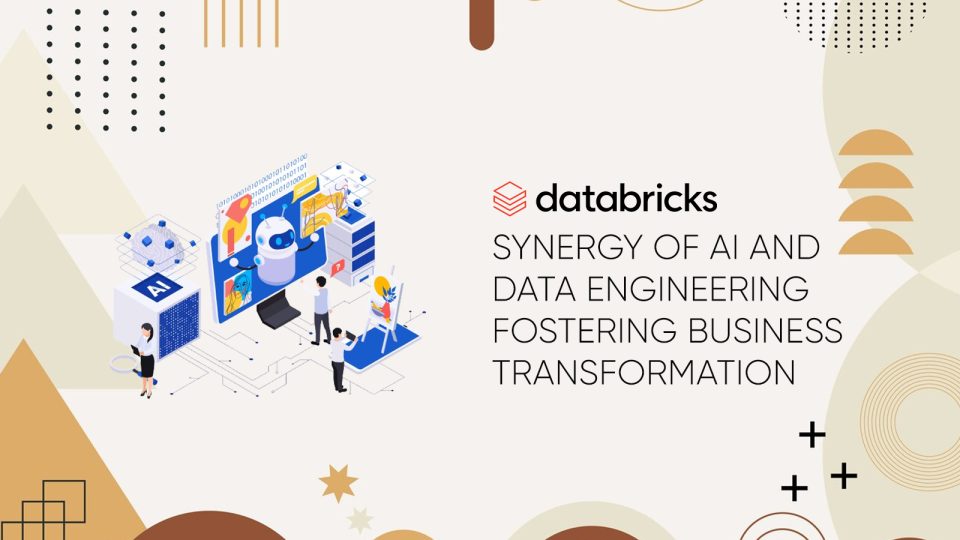The convergence of AI and data engineering has become indispensable within the growing need for technology for businesses. While each of these fields maintains its distinct identity, their interplay forms a cohesive ecosystem, facilitating the extraction of invaluable insights from data. At its core, data engineering stands as the crucial conduit interlinking AI and ML. The efficacy of AI and ML models is contingent upon the availability of high-quality data meticulously collected, cleansed, stored, and promptly accessed.

Data Engineering’s Role in AI
Data constitutes the life force of any AI initiative. Devoid of data, these models lack the requisite information for learning and application of learned patterns. Herein lies the significance of data engineering. It engineers resilient, scalable frameworks that facilitate seamless data ingestion, processing, storage, and retrieval. This systematic approach ensures a consistent, dependable flow of quality data essential for the learning process of AI models.
Establishment of a Feedback Loop
Another pivotal intersection is establishing a feedback mechanism between AI models and data engineering systems. As these models learn and make predictions, these insights should be stored and reintroduced into the model, enriching its learning process. Data engineering systems oversee this feedback loop, ensuring the continual evolution and adaptation of the model.
How AI & Data Engineering Function
For organizations to harness the potential of data and convert it into actionable insights, a cohesive and unified information infrastructure becomes imperative. This structure manages cloud-based platforms alongside all essential data, serving as the conduit for disseminating insights to users and applications. This pivotal function is encapsulated within AI and data engineering.
AI and data engineering constitute foundational services designed to leverage existing data repositories, not solely for demonstration purposes or departmental applications, but to develop scalable production systems. Comprising five primary layers, all fortified by secure data foundations:
- Platform Foundation: Facilitating the construction of an industrialized data and AI platform, fostering innovation.
- Data Trust Foundation: Supporting a data governance strategy to ensure the journey toward trusted data.
- Data Foundation: Encompassing data lakes, hubs, warehouses, and managing data ingestion processes.
- AI, Analytics & BI Foundation: Providing services, work products, frameworks, and accelerators for optimal enterprise data organization to support scalable AI implementation.
- AI, Analytics & BI Execution: Offering minimum viable products (MVPs) and accelerators to streamline the development of AI-based or AI-enabled applications efficiently.
Embracing the Future with Databricks’ Webinar
Webinar on Data Engineering & AI by Databricks
Why CIOs and C-Suites Must Engage: Benefits and Insights
As technology reshapes the landscape of business operations, the convergence of data engineering and artificial intelligence is a transformative force. To navigate this evolving terrain, Databricks presents a compelling webinar: “Data Engineering in the Age of AI.”
Scheduled for December 7, 2023, at 9.30 AM IST | 12 PM SGT | 3 PM AEDT, this webinar offers an in-depth exploration of pivotal changes triggered by AI in data engineering. Where AI has revolutionized the role of data engineers, this event seeks to shed light on essential strategies for building real-time pipelines and reshaping existing data architectures to support AI-driven use cases.
The webinar agenda covers a broad spectrum of crucial topics, including:
- Best practices for constructing robust ETL pipelines designed explicitly for analytics and AI applications.
- The role of serverless computing in simplifying complex data pipelines.
- Real-time data ingestion and transformation techniques utilizing Spark Structured Streaming and Delta Live Tables.
- Insights into orchestrating lakehouse architectures with Databricks Workflows and expediting analytics-ready data availability through Qlik.
This event ensures a comprehensive exploration of the intersection between data engineering and AI, featuring an impressive lineup of speakers from Databricks and industry leaders such as T-Mobile and Qlik. From distinguished engineers to senior product marketing managers and solution architects, the webinar boasts a lineup of experts poised to share their insights and expertise.
The webinar doesn’t just stop at knowledge sharing; practitioners attending the session can avail themselves of an exclusive offer – the opportunity to earn a $100 credit toward various Databricks certifications. This added benefit underscores the practical advantages of engaging with this informative event.


